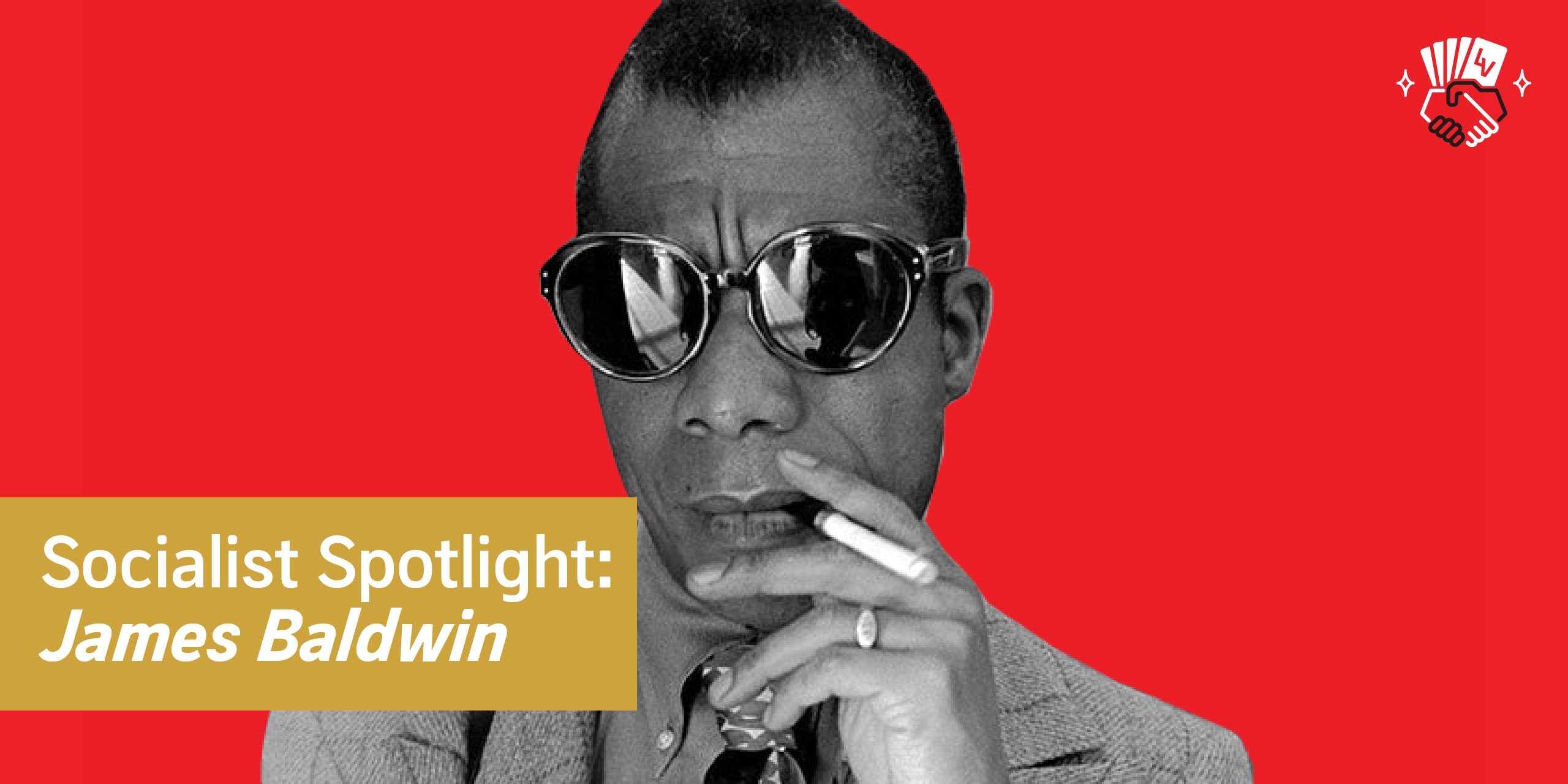Socialist Spotlight: James Baldwin
“I love America more than any other country in the world, and exactly for this reason, I insist on the right to criticize her perpetually.”
James Baldwin, Notes of a Native Son
James Arthur Baldwin was an American writer and civil rights advocate who possessed an incisive wit and impeccable ability to diagnose the ills of American society.
Baldwin – the grandson of a slave – was born in Harlem in 1924. His childhood took place during the Great Depression, when black unemployment reached 50 percent. By the time he was 14, Baldwin was also coming to terms with his attraction to men. He was intersectionality incarnate; the intertwining oppressions of poverty, race, and sexual orientation deeply informing his work and his political ideology.
In 1948, Baldwin moved to France, a country where neither his race or orientation presented the overwhelming barrier they did in the U.S. His writing career took off, and he found himself welcomed into the literary elite. But in 1957, he saw coverage of Dorothy Counts facing angry mobs during school desegregation and felt he had to do something; he decided to go home and write about the emerging Civil Rights movement.
Baldwin began to travel America, reporting on the demonstrations around the country and interviewing civil rights activists. He befriended pivotal figures in the movement like Martin Luther King Jr., Malcolm X, and Medgar Evers. Baldwin soon became a spokesman for the movement himself, his concise and poetic ability to cut to the heart of a matter indispensable.
Baldwin was profoundly affected when King, X, and Evers were all assassinated in the span of five years. Their deaths lit a fire in Baldwin, whose political ideology took a militant turn after losing these three close friends. In an interview shortly after King was killed, his anger is palpable:
“This is the message we’re trying to get across; we don’t need you to take care of us. Good Lord, we can’t afford to have you take care of us any longer! Look what you’ve done. To us. And to yourselves in taking care of us. No. I think the black people in this country should run their own schools, and run their own police force. Because you can’t do it. All you can do I bring in tanks and tear gas—and call the National Guard when it gets too tight. ”
James Baldwin, How to Cool It
By the the 1970s, Baldwin had transformed from social critic to radical advocate for a global movement against injustice. The civil rights movement expands for him to an internationalist, anti-imperialist, and increasingly socialist vision. The U.S. involvement in conflicts around the world revealed to him how easily the white liberal throws resources at endless war while doing nothing to combat Jim Crow in the South.
Radical spaces weren’t always accepting of his sexual orientation. Among the Black Panthers, a revolutionary Black socialist political organization, reactions were mixed when Baldwin attempted to get involved, despite co-founder Huey P. Newton coming to his defense. Still, he admired much of what they were doing and shared a socialist vision of the world with Newton:
“Huey believes, and I do, too, in the necessity of establishing a form of socialism in this country…The necessity for a form of socialism is based on the observation that the world’s present economic arrangements doom most of the world to misery; that the way of life dictated by these arrangements is both sterile and immoral; and, finally, that there is no hope for peace in the world so long as these arrangements obtain.”
James Baldwin, No Name in the Street
Baldwin continued to articulate that socialist vision for the remainder of his career. His time in collective social movements is reflected in the way his later work often turns to conversation and collaboration. He published books in the form of dialogues with Margaret Mead and Nikki Giovanni, was a frequent panelist, guest on talk shows, and a captivating interview subject.
James Baldwin was as prolific as he was insightful until his untimely death in 1987 and his work is just as relevant today as it was at the height of the civil rights movement.
“If the American Negro, the American black man, is going to become a free person in this country, the people of this country have to give up something. If they don’t give it up, it will be taken from them”
James Baldwin, How to Cool It
Books
Go Tell It on the Mountain by James Baldwin (1953)
Notes of a Native Son by James Baldwin (1955)
Giovanni’s Room by James Baldwin (1956)
The Fire Next Time by James Baldwin (1963)
No Name in the Street by James Baldwin (1972)
If Beale Street Could Talk by James Baldwin (1974)
Short Pieces
A Report from an Occupied Country by James Baldwin (1966)
James Baldwin: How to Cool It (interview, Esquire 1968)
The Price of the Ticket: the rewards of revisiting James Baldwin by Gary Perry (2007)
James Baldwin’s Journey by (2017)
The Radical James Baldwin by Laura Tanenbaum (2019)
Videos
James Baldwin Discusses Racism | The Dick Cavett Show (1968)
James Baldwin Responds Forcefully to Yale Philosophy Professor Paul Weiss | The Dick Cavett Show (1968)
James Baldwin & Nikki Giovanni – A Conversation (1971)
Film
I am Not Your Negro (documentary, 2016)
James Baldwin: The Price of the Ticket (documentary, 1989)
If Beale Street Could Talk (film adaption, 2018)

